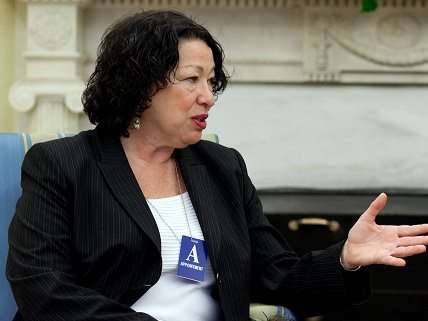Sonia Sotomayor Says SCOTUS Favors Police Officers Over Alleged Victims of Police Misconduct
Justice Sotomayor dissents from denial of certiorari in Salazar-Limon v. City of Houston.

Today Justice Sonia Sotomayor accused the Supreme Court of enacting a double-standard in qualified immunity cases that favors police officers over alleged victims of police misconduct.
Sotomayor's complaint came in the form of a dissent she filed after the Supreme Court refused to hear the matter of Salazar-Limon v. City of Houston, a case in which a police officer who shot an unarmed suspect in the back was awarded qualified immunity without first going to trial. According to the officer involved in the shooting, the suspect appeared to reach for a gun in his waistband. According to the suspect, Ricardo Salazar-Limon, he was walking away from the officer when he was shot.
The legal question is whether the federal district court erred when it issued a summary judgment in favor of the officer. A summary judgment may occur only when there are no issues of material fact in dispute, thus clearing the way for the presiding judge to reach a decision on the law without first convening a jury trial to sort out matters of fact.
According to the district judge in this case, there were no facts in dispute about the encounter between the officer and Salazar-Limon. On appeal, the U.S. Court of Appeals for the 5th Circuit upheld that judgment. Today the Supreme Court declined to review those lower court rulings.
The Supreme Court's refusal to act today is what prompted Justice Sotomayor to dissent. As she explained,
Given that this case turns in large part on what Salazar-Limon did just before he was shot, it should be obvious that the parties' competing accounts of the event preclude the entry of summary judgment for [Officer] Thompson. Thompson attested in a deposition that he fired his gun only after he saw Salazar-Limon turn and "ma[k]e [a] motion towards his waistband area." Salazar-Limon, by contrast, attested that Thompson fired either "immediately" or "seconds" after telling Salazar-Limon to stop—and in any case before Salazar-Limon turned toward him. These accounts flatly contradict each other. On the one, Salazar-Limon provoked the use of force by turning and raising his hands toward his waistband. On the other, Thompson shot without being provoked. It is not for a judge to resolve these "differing versions of the truth" on summary judgment, that question is for a jury to decide at trial. [Citations omitted.]
To make matters worse, Sotomayor wrote in conclusion, the Court's inaction today is just the latest example of a troubling pro-police pattern throughout this area of the law. "We have not hesitated to summarily reverse courts for wrongly denying officers the protection of qualified immunity in cases involving the use of force," Sotomayor wrote. "But we rarely intervene where courts wrongly afford officers the benefit of qualified immunity in these same cases."
Justice Sotomayor's dissent from denial of certiorari in Salazar-Limon v. City of Houston is available here.


Show Comments (14)